- Home
- Andrew Marr
A History of the World
A History of the World Read online
For Harry, Isabel and Emily
Contents
Acknowledgements
Introduction
Part One
OUT OF THE HEAT, TOWARDS THE ICE
Part Two
THE CASE FOR WAR
Part Three
THE SWORD AND THE WORD
Part Four
BEYOND THE MUDDY MELTING POT
Part Five
THE WORLD BLOWS OPEN
Part Six
DREAMS OF FREEDOM
Part Seven
CAPITALISM AND ITS ENEMIES
Part Eight
1918–2012: OUR TIMES
Notes
Bibliography
Index
Picture Acknowledgements
Acknowledgements
I would like to thank the following people. My long-suffering family, from my wife Jackie to my children Harry, Isabel and Emily, have put up with an abstracted, often absent apology for a human being for a long time. But this project has also meant I have been a less good friend to my friends; and so apologies to them too. I will now reform, and start drinking at lunchtime again.
This book would not have happened without the excellent Ed Victor, who has looked after me, and sometimes askance at me, for many years now; nor without the superb team at Macmillan, Jon Butler, Georgina Morley, Tania Wilde and Jacqueline Graham – another relationship that has been sustained for years. Mary Greenham, who runs most of my life, struggled hard to stop me going insane. As to whether she succeeded, the verdict remains open. Among the many historians who have kindly given their advice, read parts of the manuscript or helped me find information, are Mary Beard, and the Open University team associated with the filming project. Kate Sleight did a wonderful job of combing out some of my particularly embarrassing errors, while Sue Phillpott was a superb copy-editor: in thanking both, I of course wish to underline that mistakes remaining are all my own work.
The project itself, beginning with the BBC, was the brainchild of Chris Granlund, friend and comrade, with whom I have now made twenty-two hours of documentary television. As before, I could not have worked at all effectively without the wonderful London Library. Though I do not use researchers for my writing, many of the BBC team contributed very useful thoughts, objections and advice and are mentioned below. The BBC team was led by Kathryn Taylor, who had to juggle documentary and drama, the latter filmed in South Africa. The director-producers who did the work in the field, and with whom I have spent many hours in jolting vans, airports, dodgy hotels and dusty locations, were Robin Dashwood, Guy Smith, Renny Bartlett, Neil Rawles and Mark Radice, who suffered from a horrible bike crash but is now on the mend. The man in charge of the camera, who spent many happy months telling me to move to my left, or back a bit, was Neil Harvey, who is the best director of photography in the business, and the sound genius was Simon Parmenter. Chris O’Donnell was a particularly enthusiastic and shrewd member of the team, and I would also like to thank Alison Mills, Julie Wilkinson, Katherine Wooton and Michaela Goncalves for organizing one of the biggest projects that BBC documentaries have had to grapple with in many years.
Finally this book also depended on the friendly help of local historians and archaeologists, and our fixers in Russia, the Ukraine, Germany, France, the Netherlands, Switzerland, Spain, Italy, Greece, Turkey, Israel, Egypt, India, China, Mongolia, Australia, Japan, Mali, South Africa, Peru, Brazil, the United States and Shropshire.
Introduction
. . . what men have made, other men can understand.
Isaiah Berlin, quoting Giovanni Battista Vico
. . . history . . . is boredom interrupted by war.
Derek Walcott in The Bounty
Writing a history of the world is a ridiculous thing to do. The amount of information is too vast for any individual to absorb, the reading limitless and the likelihood of error immense. The only case for doing it, and for reading it, is that not having a sense of world history is even more ridiculous. Looking back can make us better at looking about us. The better we understand how rulers lose touch with reality, or why revolutions produce dictators more often than they produce happiness, or why some parts of the world are richer than others, the easier it is to understand our own times. The size of the subject brings obvious risks: dull abstraction on the one side; a bewildering hubbub of vivid tales on the other. I have selected subjects and moments, which seem to me usefully representative, and attempted to link them with a broader narrative. But I could have written another book with an almost entirely different selection; and no doubt another after that.
My overall theme is straightforward. In our ability to understand and shape the world around us, we humans have been a tumbling, bounding biological acceleration of skill and thinking, which has led to a recent acceleration in our numbers and our power. We now understand quite a lot about how life began on this planet, about the structure of what is around us, and the planet’s place in the cosmos. We are even beginning to explore our own self-consciousness, that bright star in ‘the awakening of the world’, as one philosopher has put it. Our population today is probably too large for the planet to sustain for very long – though that depends on how we choose to live – but our technical abilities give us at least a chance of getting through, just as we have survived other challenges. On the other hand, this technical and scientific brilliance has not been matched by much in politics to give us a similar sense of pride.
Imagine being able to summon up, and talk to, a peasant woman from Jesus’s time, or an Aztec warrior. If you showed them your mobile phone, and tried to explain how it worked (assuming you know), you would have no chance of making them understand. A world of unfamiliar concepts would have to be described to them first – almost a history book’s worth. But if you wanted to tell them about Stalin, or corrupt politicians, or the struggles between dictators and people in the Arab world today, they would get the picture immediately. We have made advances. Most places are far less violent than earlier societies. A world under the United Nations festers with poverty and splutters with wars, but it is better than a world of competing empires. Yet when it comes to our appetites, our anger, our relationship with power, there has been nothing like the advance we have seen in our scientific and technical culture. The more one knows about our early history as hunter-gatherers and our long history as farmers, and then about the dizzying acceleration of world trade and industry that has taken us into modern times, the less mysterious today’s world seems. In the end, I hope most of what follows will make the reader think not only of long-dead empires and far-off places, but of the here and now.
History, meanwhile, keeps changing. This has been a golden age for history buffs, with fresh and detailed work in a vast number of fields pouring from the presses every year – everything from histories of money to forgotten European realms, from comparisons between the Roman and Chinese empires to new insights into Stalin and the Second World War. Nobody could hope to read all of it, but this book has been fuelled by manic reading for years, across many different fields. I have confined the endnotes to essential reference points only because of the endless profusion of ‘additional reading’ that would otherwise result; I calculate that around two thousand books, never mind pamphlets and journals, have been read for what follows.
I have also been hugely lucky to have made a series of eight films for the BBC on world history, a project which allowed me to visit around sixty sites, everywhere from the Peruvian deserts to the Ukraine. Seeing where things happened – Tolstoy’s estate, or the workers’ village for Egypt’s Valley of the Kings – does affect how one understands particular stories. Certainly, the television project has changed my own approach. Television storytelling insists on zoom
ing in on this person doing or saying this, then with that result. Television abhors abstraction. It wants character, dates, actions. As a result much of what follows is, unapologetically, an example of a kind of history-writing that is currently very unfashionable, the ‘great man/great woman’ school of history, albeit twisted into new shapes by environmental, economic and social histories.
For there are no abstract forces in history. Everything that brings change is natural. Some of it has been non-human – the climatic shifts, volcanoes, diseases, currents, winds, and the distribution of the plants and animals that have shaped humanity. But most of human history has been made by human choice and human muscle. That is, it has been made by individuals, acting inside their societies. Some of them have had a much greater impact than others, hence the ‘great’. Because we live in a slightly hysterical democratic culture, which yelps loudly about equality in order to dodge talking about its huge gaps in wealth and power, there is a certain nervousness about this. Isn’t the history of small changes to the domestic practices of farming families, or the role of women in mercantile early-modern networks, more ‘real’ than what emperors or inventors did?
In short, no. History is about change, and it makes sense to concentrate on the biggest change-makers. Yes, all people are equal in their dignity and their potential value. Yes, most of us live our lives in the lulls. Yes, everyone should have equal status in law. But to suggest that therefore everyone’s story or achievement is equal, and of equal interest, is ludicrous. The Burgundian peasant who followed the oxen, fed his family, lived blamelessly, and who died, mourned by his village, at the ripe old age of forty-two, is not as important a historical figure as Charles V of Spain, or Siddhartha, the Buddha. It is interesting to read about the sailors of coastal Europe who found new fishing grounds and made small but useful improvements to their vessels as they searched further and further away for cod. Christopher Columbus depended on their accumulated knowledge. But as an individual life, his story matters more.
No ‘great’ people are anything other than firmly embedded in their societies or time, giving them a limited range of possible actions and thoughts. Apart from religious leaders, it is almost impossible to find a historic character of whom we can unequivocally say that, without him, or her, such-and-such would never have happened. James Watt could not have invented his steam engine a hundred years earlier or if he had been living in Siberia; he was standing on the shoulders of many other inventors, mechanics, educationalists and merchants. He was in the right place at the right time. If he had not invented the separate condenser, somebody else would have done. But he did invent his new kind of steam engine; and the hows and whys of that moment matter. The peoples of the Mongolian steppe, pushed by hunger and realizing how important a weapon their horses were, would always have attacked the settled societies around them – and often did so. But had Genghis Khan not united warring clans and provided ruthless, inspirational leadership, the story of much of Asia would have been different.
So what follows is inevitably an elitist history, since the people who had the power, money or leisure to change societies were disproportionately drawn from those who were already privileged. This sometimes does mean ‘kings and queens’. Only a member of the privileged Mughal ruling family could have become emperor when Aurangzeb did. But the fact that it was Aurangzeb, and not one of his brothers, had important consequences, because he was a religious zealot who bankrupted Mughal India and inadvertently opened the door for the British. Cleopatra was a pure-bred member of the Greek ruling house of Egypt (not that they were very pure) but the fact that she, and not her brother, ruled at the time of Julius Caesar and Mark Antony had consequences for the classical world.
Later, as the churn of more educated societies throws up a wider range of characters, the class background of the change-makers widens. But the great men or great women are the ones with the brains, courage or luck to make breakthroughs that others do not. Robert Oppenheimer, father of the atomic bomb, matters more than the very clever physicists of his time who were never at Los Alamos. Hitler was a lower-middle-class drifter who became a brilliant demagogue. Germany without Hitler would have been different, and his story is vastly more important than the story of the many ultranationalist beer-hall orators whose parties shrivelled and vanished. So it is clear, I hope, that when I say this is a ‘great man’ way of telling history, I am not suggesting that anyone stands outside the coincidence of their time and place – the social moment which empowers them or neuters them. Nor am I using ‘great’ in a way that implies moral admiration. Some of the greatest of great men have also been the biggest bastards alive.
As this story advances I hope readers will enjoy the nit and grit of little facts that switch on the lights, all of which are plundered from real historians. In a recent book on Italy we learn that at the start of Italian unification, in 1861, a grand total of 2.5 per cent of Italians spoke what we would recognize as Italian.1 From another, that to pass their exams, Chinese bureaucrats in the fifteenth and sixteenth centuries had to memorize 431,286 different characters.2 The first throws light on Italy’s struggle to be a modern nation. The second reminds us why China took so long to develop a large literate middle class. Had it done so – had Chinese depended on twenty-odd phonetic letters – then China’s history would have been different.
The shape of human history can be told through numbers, the rising number of people on the planet, from perhaps a few thousand pairs at our last moment of near-extinction to today’s leap towards seven billion now and nine billion before long. If we put these numbers on a graph, with a timeline as our horizontal, then the story would still be a simple but dramatic acceleration leap.
To begin with, the long flat acres of time when the human population barely seemed to move. There are up to seventy thousand years of hunter-gatherer family groups spreading slowly from Africa. There are around ten thousand years during the invention of agriculture, the development of tribal societies and small towns, when the population curve only slowly starts to stretch its neck upwards.
Next come the beginnings of civilizations, around 5,500 years ago, with the next great invention after farming, which is writing. Then follows the rest of human history, starring trade and the industrial revolution. In our own times the people-line rockets skywards, mainly thanks to cleaner water and medicine. Why has the acceleration happened? Why such a slow burn, followed by a rocketing population? It originates in the ability to alter the rest of the natural world shown by Homo sapiens sapiens (and what an exuberantly boastful tag we have chosen – two ‘wises’, not one). Other creatures adapt to the environment around them, evolving characteristics and behaviour which give them a niche, a biological cranny, in which they can survive and even thrive. Merely by living, they may change that environment, as anyone who has seen termite nests, or watched the impact of beavers on a river, can confirm. All life changes the world, which is in a constant process of flux.
Humans, however, with their superior mental and communications skills, have taken this ability to shape the world to a different level. We have hunted and driven other mammals to extinction. We have tethered and changed animals beyond recognition – look at the ancestors of the modern cow, or the Highland terrier. We have done the same to plants – taking a corn-cob all the way from a fingerbone-sized piece of starch to a swollen barrel of nourishment, for instance. Now, with fish farms we are altering even the size, shape and musculature of fish. This has given us a surplus of energy no mere predator could hope for. Using it, we have grown from family groups to tribes to villages to cities to nations, allowing us to change much more of our original environment. We have altered the courses of rivers and dug into the mineral covering of the planet, pulling out coal, oil and gas to give ourselves more power, exploiting ancient vegetable reserves that lived and died long before we arrived. In very recent times our understanding has allowed us to develop medicines and technologies that have extended our lifespans dramatically.
> Again, none of this has come about because of impersonal forces. It has been done by the accumulated acts of millions of individual humans, working away in our own immediate interest like the tiny creatures who make up vast coral reefs – except, of course, with self-consciousness, and so able to give a running commentary on it all. One survey of human history concludes simply: ‘What drives history is the human ambition to alter one’s condition to match one’s hopes.’3 A better chewy root; a fatter goat; safety in the trees from the raiders; a livelier tune; a more interesting story; a new flavour; more children for one’s old age; a way to avoid the taxman; a watch; a mangle; a bicycle; an air-ticket to the sun – these are the modest lures and small whips that drive us forward until the next leader of some kind makes another leap.
There is no evidence that we have changed biologically or in our instincts during the time covered by this book. There have been small evolutionary changes. The way our upper and lower teeth meet has altered as our diet has changed; the ‘overbite’ caused by more grinding of grain came quite late on. Human groups who kept cows so as to drink their milk developed digestive systems to cope, while Asians who never did this did not. The different human populations that scattered out of Africa in different directions, and eventually squatted down in fertile spots, became separated from one another. They developed cosmetic differences: skin colour, eye shape and subtle variations in skull design, which produced a certain mutual suspicion after those geographical distances were closed again. But in our rough size and strength, our abilities to imagine, reason, communicate, employ delicate hand strength, plan and sweat, we have stayed the same. We know more. We have not got smarter.

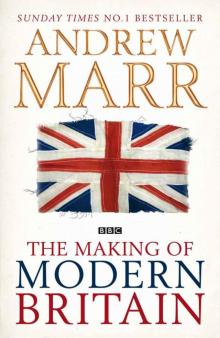 The Making of Modern Britain
The Making of Modern Britain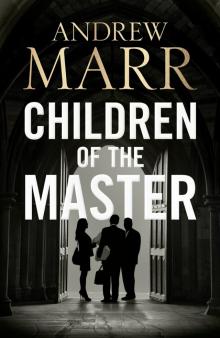 Children of the Master
Children of the Master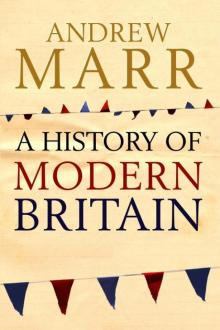 A History of Modern Britain
A History of Modern Britain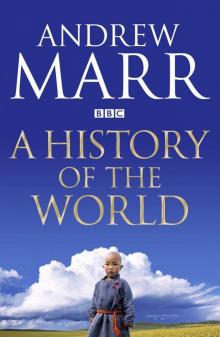 A History of the World
A History of the World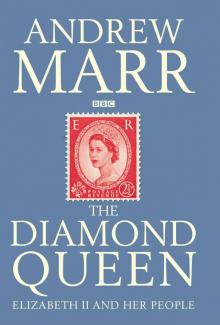 The Diamond Queen
The Diamond Queen